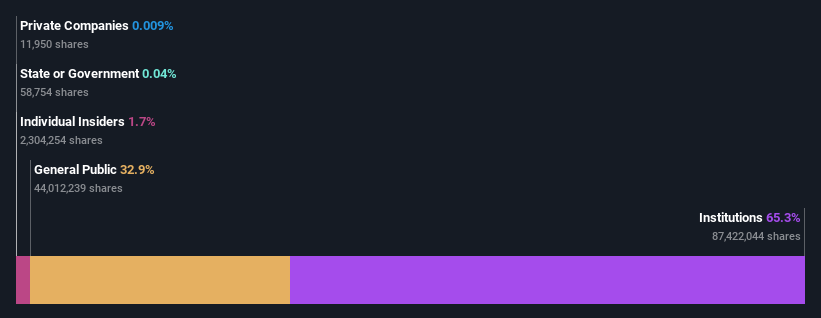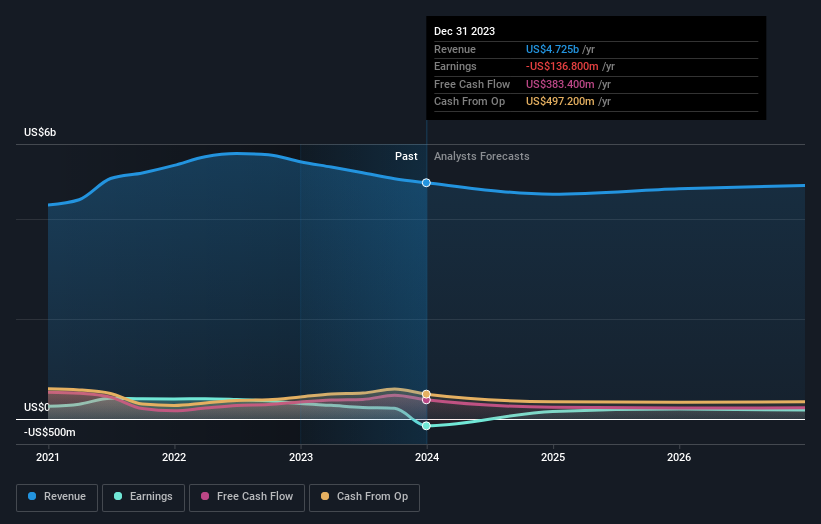Stock Analysis
- United States
- /
- Consumer Durables
- /
- NYSE:LEG
In the wake of Leggett & Platt, Incorporated's (NYSE:LEG) latest US$225m market cap drop, institutional owners may be forced to take severe actions

Key Insights
- Institutions' substantial holdings in Leggett & Platt implies that they have significant influence over the company's share price
- A total of 25 investors have a majority stake in the company with 50% ownership
- Using data from analyst forecasts alongside ownership research, one can better assess the future performance of a company
A look at the shareholders of Leggett & Platt, Incorporated (NYSE:LEG) can tell us which group is most powerful. With 65% stake, institutions possess the maximum shares in the company. That is, the group stands to benefit the most if the stock rises (or lose the most if there is a downturn).
And institutional investors endured the highest losses after the company's share price fell by 8.9% last week. This set of investors may especially be concerned about the current loss, which adds to a one-year loss of 42% for shareholders. Institutions or "liquidity providers" control large sums of money and therefore, these types of investors usually have a lot of influence over stock price movements. As a result, if the decline continues, institutional investors may be pressured to sell Leggett & Platt which might hurt individual investors.
Let's take a closer look to see what the different types of shareholders can tell us about Leggett & Platt.
See our latest analysis for Leggett & Platt

What Does The Institutional Ownership Tell Us About Leggett & Platt?
Many institutions measure their performance against an index that approximates the local market. So they usually pay more attention to companies that are included in major indices.
We can see that Leggett & Platt does have institutional investors; and they hold a good portion of the company's stock. This implies the analysts working for those institutions have looked at the stock and they like it. But just like anyone else, they could be wrong. When multiple institutions own a stock, there's always a risk that they are in a 'crowded trade'. When such a trade goes wrong, multiple parties may compete to sell stock fast. This risk is higher in a company without a history of growth. You can see Leggett & Platt's historic earnings and revenue below, but keep in mind there's always more to the story.

Since institutional investors own more than half the issued stock, the board will likely have to pay attention to their preferences. We note that hedge funds don't have a meaningful investment in Leggett & Platt. Looking at our data, we can see that the largest shareholder is BlackRock, Inc. with 13% of shares outstanding. Meanwhile, the second and third largest shareholders, hold 9.7% and 5.4%, of the shares outstanding, respectively.
Our studies suggest that the top 25 shareholders collectively control less than half of the company's shares, meaning that the company's shares are widely disseminated and there is no dominant shareholder.
While studying institutional ownership for a company can add value to your research, it is also a good practice to research analyst recommendations to get a deeper understand of a stock's expected performance. There are a reasonable number of analysts covering the stock, so it might be useful to find out their aggregate view on the future.
Insider Ownership Of Leggett & Platt
The definition of company insiders can be subjective and does vary between jurisdictions. Our data reflects individual insiders, capturing board members at the very least. Management ultimately answers to the board. However, it is not uncommon for managers to be executive board members, especially if they are a founder or the CEO.
Most consider insider ownership a positive because it can indicate the board is well aligned with other shareholders. However, on some occasions too much power is concentrated within this group.
We can see that insiders own shares in Leggett & Platt, Incorporated. This is a big company, so it is good to see this level of alignment. Insiders own US$41m worth of shares (at current prices). It is good to see this level of investment by insiders. You can check here to see if those insiders have been buying recently.
General Public Ownership
The general public-- including retail investors -- own 33% stake in the company, and hence can't easily be ignored. While this size of ownership may not be enough to sway a policy decision in their favour, they can still make a collective impact on company policies.
Next Steps:
While it is well worth considering the different groups that own a company, there are other factors that are even more important. Consider for instance, the ever-present spectre of investment risk. We've identified 2 warning signs with Leggett & Platt , and understanding them should be part of your investment process.
Ultimately the future is most important. You can access this free report on analyst forecasts for the company.
NB: Figures in this article are calculated using data from the last twelve months, which refer to the 12-month period ending on the last date of the month the financial statement is dated. This may not be consistent with full year annual report figures.
Valuation is complex, but we're helping make it simple.
Find out whether Leggett & Platt is potentially over or undervalued by checking out our comprehensive analysis, which includes fair value estimates, risks and warnings, dividends, insider transactions and financial health.
View the Free AnalysisHave feedback on this article? Concerned about the content? Get in touch with us directly. Alternatively, email editorial-team (at) simplywallst.com.
This article by Simply Wall St is general in nature. We provide commentary based on historical data and analyst forecasts only using an unbiased methodology and our articles are not intended to be financial advice. It does not constitute a recommendation to buy or sell any stock, and does not take account of your objectives, or your financial situation. We aim to bring you long-term focused analysis driven by fundamental data. Note that our analysis may not factor in the latest price-sensitive company announcements or qualitative material. Simply Wall St has no position in any stocks mentioned.

Simply Wall St
About NYSE:LEG
Leggett & Platt
Leggett & Platt, Incorporated designs, manufactures, and sells engineered components and products in the United States, Europe, China, Canada, Mexico, and internationally.
Established dividend payer and fair value.
